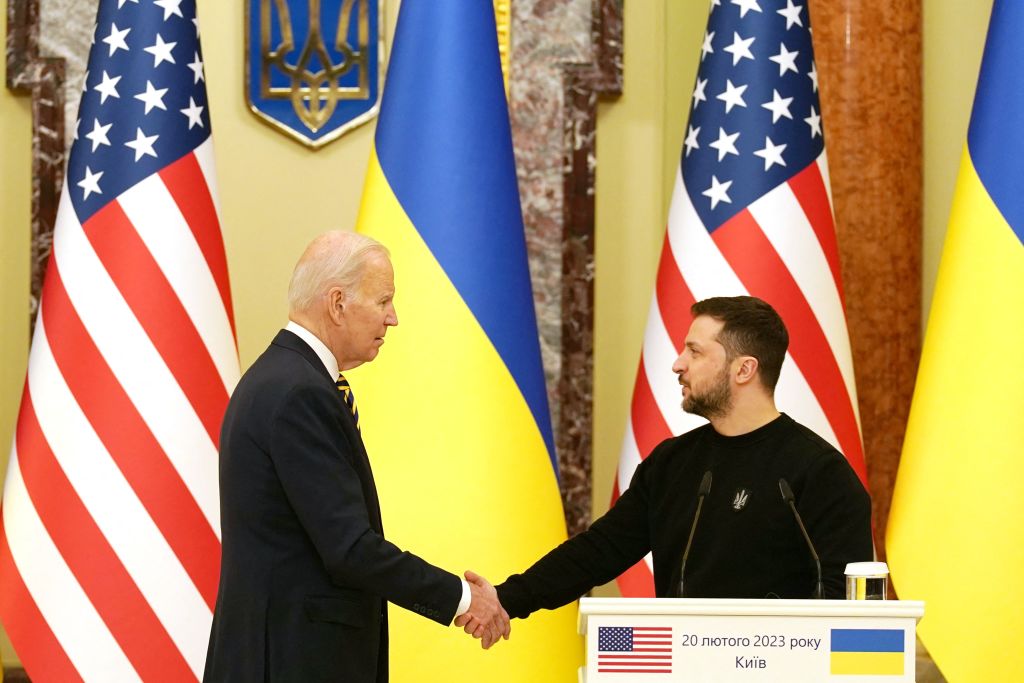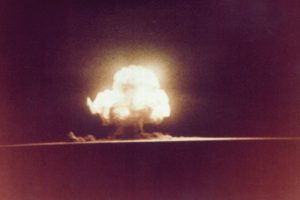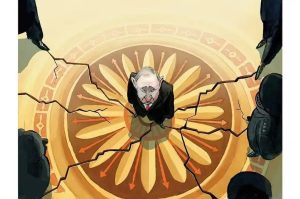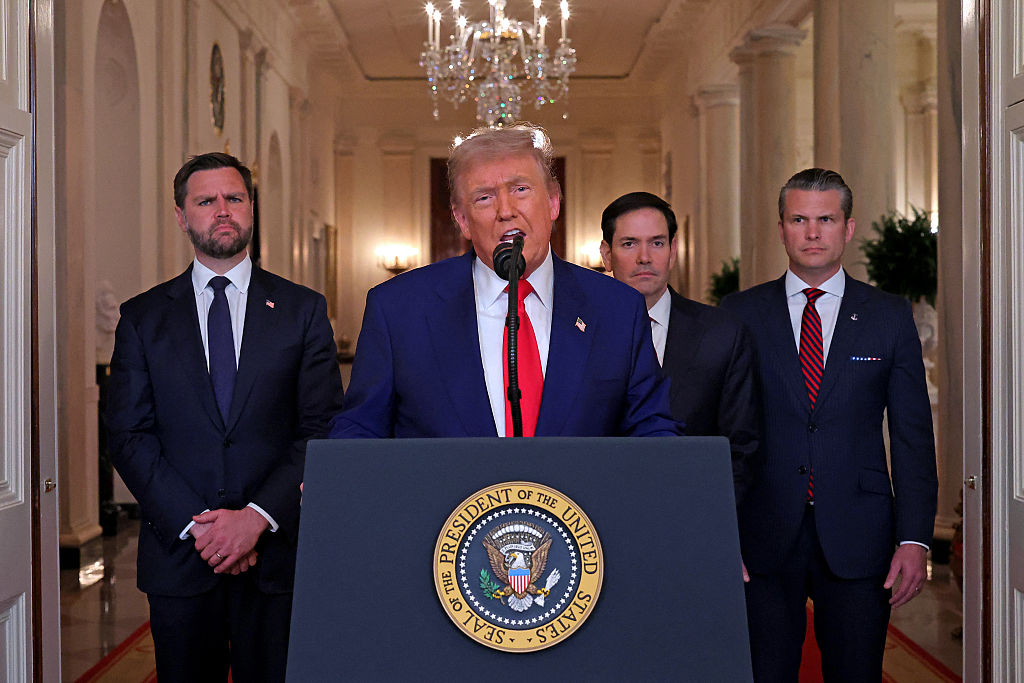As World War Two entered its final months, Anglo-American forces advanced into Nazi Germany to finish off Hitler’s Reich. In the East, the Red Army attacked up the Danube toward Vienna. Meanwhile, at the Yalta conference in February 1945, Stalin moved to cement his post-war political control over Eastern and central Europe. Germany’s defeat was imminent, but western leaders began to worry about how much Stalin’s forces would seize before the final surrender.
As Russia continues to endure heavy casualties in Ukraine, we’re in a similar predicament today. The war shows no signs of ending any time soon — and casualties continue to mount on both sides. But might the end of World War Two show a way out?
The US has the credibility and capability to offer the kinds of personal concessions which may be necessary
In 1945, Nazi SS General Karl Wolff and American office of strategic services director in Switzerland Allen Dulles held secret talks throughout March and April to effect a local surrender of German forces in Italy and western Austria. The effort ultimately expedited a German surrender in northern Italy a week before the official end of the war in Europe.
Could a similar backdoor deal help Ukraine in its patriotic war against Putin’s Russia? The hoped-for blitzkrieg envisioned by Putin to quickly decapitate Ukraine’s government and install a pro-Kremlin puppet regime has failed. Russian forces suffered serious reverses outside Kyiv as well as in Kherson and Kharkiv as casualties soared to over 100,000 killed and wounded.
Yevgeny Prigozhin announced that his Wagner mercenary group captured Bakhmut after a bloody, ten-month siege, capping off a public relations campaign that saw him lambast the Russian defense minister, chief of the general staff, forces led by close allies of Chechen leader Ramzan Kadyrov and even, without mentioning him, Putin for gross incompetence. As Ukrainian forces moved to encircle the city, Prigozhin made it known that it was the Russian regular army’s problem now and that his people were moving out.
Meanwhile, the world is monitoring the devastating aftermath of the Nova Kakhovka dam destruction, as well as the start of the long-awaited Ukrainian counteroffensive, particularly into Donetsk and ultimately south toward Crimea. For the US and others militarily aiding Ukraine with a stake in its victory, there is only one question now: will Kyiv liberate enough territory to fundamentally change the operational picture on the ground (Russia still controls roughly 20 percent of the country)?
While rhetorically standing against Russia’s aggression and demanding the full restoration of Ukraine’s 1991 borders, divisions persist among Ukraine’s allies about the quality and quantity of aid to Kyiv. In Europe, the desire of those in Poland and the Baltic states to see Russian forces completely driven from Ukraine confronts policy zigzags from the likes of French president Macron (who last year floated security guarantees for both Ukraine and Russia). In America, the debate over whether to prioritize threats from China in Asia and shift focus away from Ukraine — citing trade-offs for America’s own capacity, the need for the Europeans to do more and China’s ascent — or give Ukraine the proverbial kitchen sink with more expansive rights to strike inside Russia to force a comprehensive Russian military defeat is growing louder.
Ukraine’s allies now face two significant challenges: Putin’s determination to wage war for as long as possible and China’s direct intervention to mediate a ceasefire on its terms (which would also, on balance, favor Putin). Thus, the West’s desire to see Putin lose in Ukraine clashes with his commitment to fight to the end with an as yet undetermined level of practical support from the Chinese. The Biden administration has made a public promise to aid Ukraine for “as long as it takes.” But over the coming months, the conflict in Ukraine may more closely resemble the Winter War between Finland and the former Soviet Union rather than complete victory for Kyiv.
The practical costs of Putin’s war, Russia’s growing isolation from the West, loss of prestige across the former Soviet space and increasing subordination to China (surrendering Russia’s one-time balancing role between East and West) has unnerved Russia’s elites. From leaked phone conversations between business magnates condemning Putin in no uncertain terms to Prigozhin’s outbursts to Kadyrov’s refusal to implement further mobilization in his republic, different Kremlin factions are fighting their own war over the war. There are reports of private military companies forming across Russia — regional governors are not taking any chances as Moscow’s detachment grows.
The US — Ukraine’s primary security partner without whose support it cannot prevail — must opt for a radical solution. It desires to end the carnage with as big a victory for Kyiv as possible. But it is faced with Putin’s ideological determination to continue the war, China’s involvement and the fog of Russian elite discontent over Putin’s inability to win. Therefore, it should, on its own, through backchannels, consider exploring avenues for a new “Operation Sunrise” in Ukraine to negotiate isolated, local surrenders of Russian forces. The ideal scenario would be a chain reaction of surrenders or desertions to both directly aid Ukraine’s counteroffensive and put Kyiv in a strong position for future talks.
Those with whom the US may find itself secretly dealing, as Dulles had to with Wolff, could well be people who rightly belong in the dock of an international war crimes tribunal. Unfortunately, waiting for the likes of Putin opponents like Ilya Yashin or Vladimir Kara-Murza to be the ones sitting across the table is a fool’s errand.
America’s aim is to help Ukraine win and end the war, while being mindful of its own limitations and growing threats elsewhere. And only the US has the credibility and capability to offer the kinds of personal concessions which may be necessary to effect local surrenders (the political cost to Ukraine’s government would be too high).
Allowing the Chinese to diplomatically outmaneuver America while creating a new reality of drip military and economic support for Putin to freeze the war would be disastrous. At the same time, seeking real peace now with a Putin who sees in Ukraine’s victory the end of his regime and possibly life also makes little sense. Without an acceptance of Putin’s terms, the Ukraine war will not end so long as he remains in power with the ability to keep fighting.
That leaves Russia’s disenchanted, warring elites and attempts to directly engage them. Western leaders should not pin their hopes on a mass rising from below in Russia against Putin’s invasion — it has not happened and is unlikely to as Russians adapt to a new, long reality of war. Prominent members of Russia’s democratic opposition have acknowledged that a palace coup against Putin (led perhaps by figures such as Prigozhin), which would lead to a deal with Ukraine and its allies to end the war, is more realistic.
There are many unknowns about who, if anyone, on the Russian side would be open to discussing local surrenders. Nevertheless, America should now take the diplomatic initiative. It should identify those in positions of authority and commanding sizable forces on the ground in Ukraine who are fed up with Putin’s war. These people will recognize that Russia cannot win, will be concerned for the lives and futures of its people and may be keen to do a deal. There is also enough here to unite both strands of American public opinion regarding the war and America’s continuing engagement with it. Only by reaching out in this way will the bloodshed in Ukraine end any time soon.
This article was originally published on The Spectator’s UK website.

























